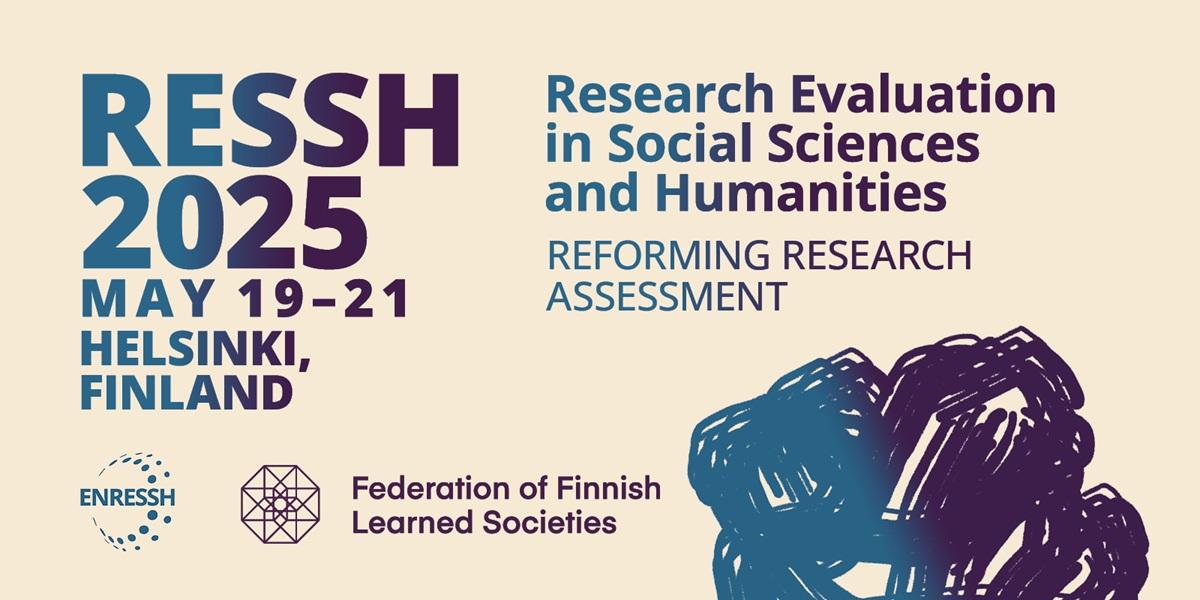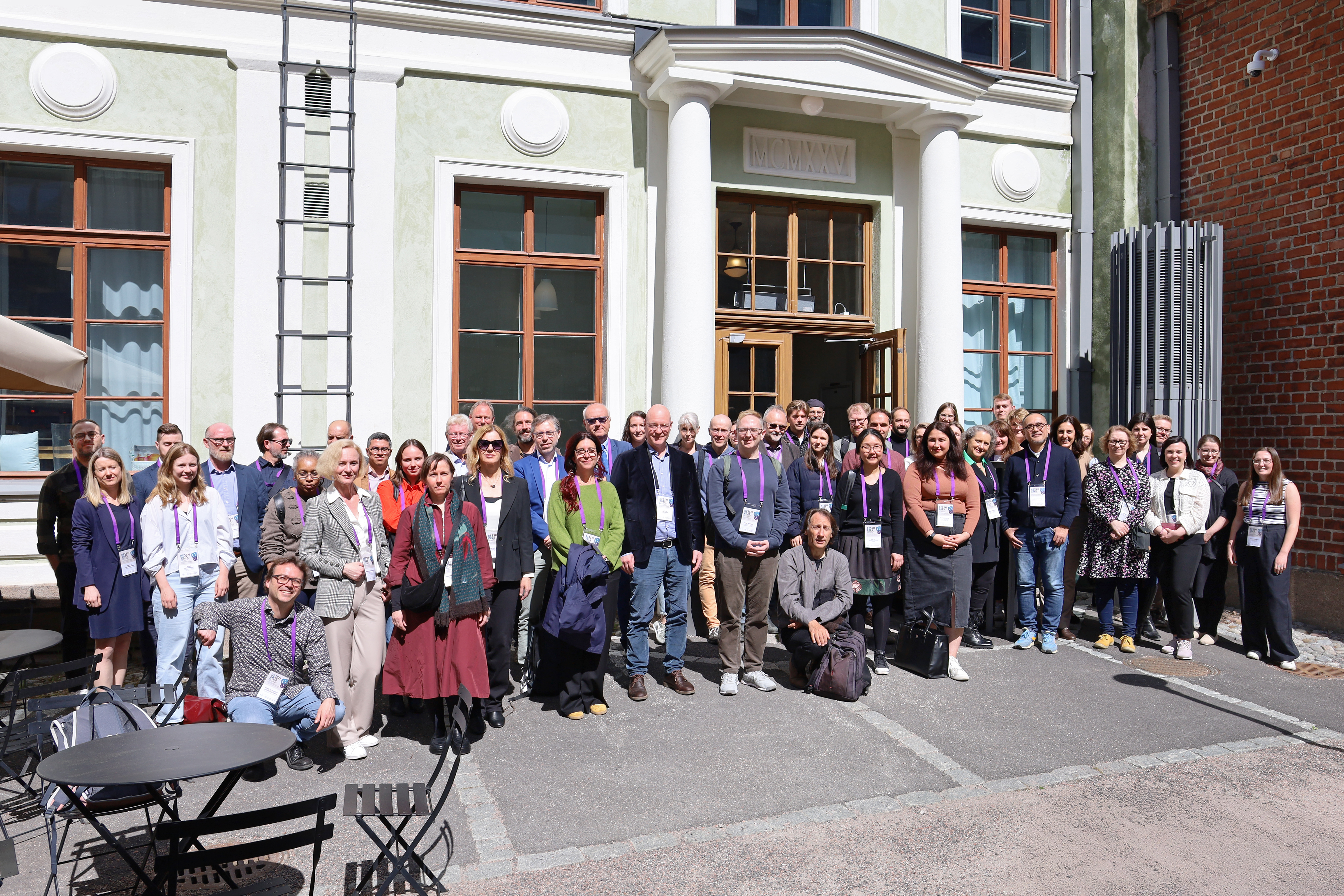
RESSH2025 conference of the international association ENRESSH (European Network for Research Evaluation in the SSH) is organized 19-21 May, 2025, in Helsinki, Finland. It brings together specialists on various topics of research evaluation and research policy with a special focus on the social sciences, humanities and the arts (SSH).
- Dates: 19-21 May 2025
- Submissions: Closed
- Acceptance confirmation: authors have been informed 17 March
- Conference language: English
- Registration: is open until 5 May here
- Registration fees:
- PhD students 75 euros
- ENRESSH members 100 euros
- Non-ENRESSH members 125 euros
- Registration fees:
- Conference venue: House of Science and Letters (Tieteiden talo), Kirkkokatu 6, 00170 Helsinki
- Practical information: here
- Local organizer: Federation of Finnish Learned Societies
- Contact: janne.polonen@tsv.fi and mira.soderman@tsv.fi
- Hashtag: #RESSH2025
Programme
The final programme of the RESSH2025 and the Book of Abstracts with 46 oral presentations and 5 posters is available.
-
Tiedosto
After the RESSH2025, on Wednesday 21 May 14:00-15:30, SCIROS project organizes a Workshop on Reforming Research Evaluation in SSH (info and registration here).
Reflections from the RESSH Conference

We want to thank each participant for their precious presentations, engagement, observations, questions and criticism. We particularly thank the session chairs for their great job in coordinating the presentations and discussions.
The discussions over these two days showed just how committed and thoughtful the RESSH community is in responding to the challenge of making research assessment more responsible, inclusive, and meaningful.
Key challenges emerged
One major challenge is creating assessment systems that truly value openness and diversity in all their forms. We need to move beyond the term "non-traditional outputs" and find ways to recognize new categories of research contributions in our evaluations.
Several discussions reminded us that openness is not an end in itself. It is a means to an end that is the growth and improvement of society.
Another important direction is ensuring that our systems recognize the many different pathways through which research can generate impact, both within academia and beyond. Different perspectives emerged on this topic. Some see societal impact as separate from research quality, while many argued that societal impact should be considered a core dimension of research quality, not something external to it.
Perhaps most importantly, one idea strongly emerged: assessment itself must be understood as a research activity. We should approach it with the same critical thinking and care that we apply to research itself.
Several simple but important statements emerged from our conversations, all linked by a common goal: improving the way we think about and carry out research assessment, making it connected to real research practices:
- We need to evaluate research together with the people being evaluated
- Research results are temporary signs of an ongoing process. If we focus only on what is published at the end, we risk missing the value of the work behind it
- The criteria we use to evaluate research are not natural facts — we created them. If we use them to control what kind of research is done, we risk forgetting what science is really for
- Evaluation is never neutral — it influences what kind of research is done, how it's done, and who is able to do it
- We must support diverse career paths and scholarly identities, rather than forcing everyone into a single model
Moving forward
What we take away most from this conference is the vitality of research on research assessment, the sense of commitment in particular in SSH. What emerged very clearly is that we are not only discussing evaluation, we are also reflecting on our own research practices. This is exactly what can help us build better assessment systems — ones that truly serve both the research community and society as a whole.
We look forward to seeing how these ideas will continue to grow and influence the way we assess and value research — in line with the principles of DORA, CoARA, and other institutional commitments — and how they will help build a stronger sense of shared responsibility and accountability in our community.
The conversation continues: we are excited to welcome everyone to Florence in Spring 2026 for RESSH 2026, where we will further discuss and improve upon these vital questions that shape the future of research assessment.
Keynote

Keynote speaker
Toma Tasovac is the Director of the Belgrade Center for Digital Humanities (BCDH) and Director Emeritus of the pan-European Digital Research Infrastructure for the Arts and Humanities (DARIAH). With an academic background in Comparative Literature and degrees from Harvard, Princeton and Trinity College Dublin, Toma's areas of scholarly expertise include historical lexicography and the development of language resources, data modeling, digital editions and research infrastructures. He is the co-creator of TEI Lex-0: a baseline encoding format for lexicographic data, which received the 2020 Rahtz Prize for TEI Ingenuity from the TEI Consortium. He has played leading roles in numerous digital humanities projects funded by national and international agencies, including Erasmus+, Horizon 2020, Horizon Europe and the National Endowment for the Humanities.
Keynote title: Reshaping Research Assessment: What Research Infrastructures Have Got to Do With It?
In recent years, funders, institutions, and scholarly communities have intensified efforts to rethink ways of measuring research quality. Traditional metrics such as citation counts or journal impact factors have often fallen short in capturing the diverse, collaborative, and evolving nature of scholarship, while the long-standing focus on published final results has tended to overlook crucial scholarly activities such as data curation, software development, methodological innovation, and training. In this keynote, I will explore the role that research infrastructures can play in reshaping research assessment practices by helping us shift the focus from rigid, product-oriented models to more holistic approaches that recognize knowledge creation as a dynamic, multi-step process.
CALL FOR SUBMISSIONS
The evolving landscape of research assessment is among the twenty key actions in the European Research Area 2020–2024 agenda. This priority has taken shape through the Towards a Reform of the Research Assessment System—Scoping Report, issued in 2021 by the European Commission, outlining objectives and principles for a renewed evaluation approach. In line with this, the European Council’s Conclusions on the Assessment of Research and the Implementation of Open Science of June 2022 stress the need to address limitations in current systems to better support the diversity of research outputs, foster interdisciplinary work and promote multilingualism, moving towards a more qualitative and inclusive evaluation model. The Agreement on Reforming Research Assessment (ARRA) and the Coalition for Advancing Research Assessment (CoARA) provide a common direction for these efforts.
This shift calls for rethinking frameworks to better recognize the diverse contributions of researchers and institutions, aligning assessments with the evolving needs of science. Research assessment reform should incorporate a range of approaches, including epistemic, ethical, and legal considerations, as well as factors such as inclusiveness, open science, sustainability, and societal impact. This transformation involves not only revising measurement practices but also broadening our understanding of valuable and impactful research. Central to this effort is the role of infrastructure, which must support fair and transparent assessments aligned with open science and diverse research outputs. ENRESSH/EvalHum and its RESSH conference has been at the forefront of rethinking and improving research assessments for more than a decade by acting as a platform of scientific and policy exchange and empirical inquiry. The RESSH25 conference goes therefore back to its roots and links explicitly to the growing research assessment reform movement.
We welcome abstracts for presentations and posters that explore these themes from theoretical, empirical, and practical perspectives, addressing challenges and proposing actionable solutions for the future of research assessment. Submissions related to CoARA activities are particularly welcome. We encourage diverse perspectives and approaches that critically engage with the evolving landscape of research assessment and contribute to meaningful progress in this area.
Contributions may focus on case studies, policy analyses, empirical studies, theoretical frameworks, and methodological innovations. The maturity of the contributions can range from presentations of work-in-progress to reports to papers. Abstracts will be made available prior to the conference.
Topics
Topics might include, but are not limited to, the following:
- Diversity in research contributions
- Evaluation of interdisciplinary research
- Recognition of non-traditional career paths
- Societal impact and community engagement
- Qualitative approaches and peer review
- Peer review standards and practices
- Integration of narrative CVs
- Balancing qualitative and quantitative assessments
- Beyond traditional metrics
- Alternatives to journal impact factors and h-index
- Development of holistic evaluation models
- Creation of inclusive and responsible metrics
- Rethinking institutional rankings
- Impact of rankings on researcher evaluation
- Institutional autonomy in setting evaluation criteria
Submissions
There are two types of contributions to the conference:
Paper
- Paper presentations allow for 20 minutes of presentation, followed by 10 minutes of discussions.
- Extended abstract containing:
- A clear and descriptive title
- Names and affiliations of all authors
- Keywords (5) relevant to the research
- Main body
- References (if applicable)
The extended abstract must be between 600 and 1,200 words, excluding references.
Poster
- Poster presentations will be held during one or more dedicated poster sessions.
- Short abstracts containing:
- A clear and descriptive title
- Names and affiliations of all authors
- Keywords (3-5) relevant to the research
- Main body
The abstract must not exceed 400 words.
Scientific committee
- Ginevra Peruginelli (Chair), Institute of Legal Informatics and Judicial Systems - National Research Council, Italy
- Janne Pölönen (Local Organising Chair), Federation of Finnish Learned Societies, Finland
- Alesia Zuccala, University of Copenhagen, Denmark
- Alex Rushforth, University of Leiden, the Netherlands
- André Brasil, University of Leiden, the Netherlands
- Emanuel Kulczycki, Adam Mickiewicz University, Poznań, Poland
- Erzsébet Tóth-Czifra, CoARA, European Science Foundation, France.
- Fernanda Beigel, Universidad Nacional de Cuy, Argentina
- Francesca Di Donato, Institute of Computational Linguistics "A. Zampolli", National Research Council, Italy
- Gemma Derrik, University of Bristo, United Kingdom
- Geoffrey Williams, Professor emeritus, Université de Bretagne Sud, France
- Gunnar Sivertsen, Nordic Institute for Studies in Innovation, Research and Education, Norway
- Jack Spaapen, ScienceWorks, the Netherlands
- Jelena Brankovic, Robert K. Merton Center for Science Studies, Humboldt-Universität zu Berlin, Germany
- Jon Holm, Research Council of Norway, Norway
- Julia Olmos Peñuela, University of Valencia, Spain
- Kamila Lewandowska, University of Warsaw, Poland
- Lai Ma, University College Dublin, Ireland
- Laura Rovelli, CLASCO/FOLEC, Argentina
- Lucia Cespedes, Erudit, Canada
- Lynne Bowker, Université Laval, Canada
- Michael Ochsner, ENRESSH – European Network for Research Evaluation in the Social Sciences and Humanities
- Mikael Laakso, Tampere University, Finland
- Mira Söderman, Federation of Finnish Learned Societies, Finland
- Nataša Jermen, The Miroslav Krleza Institute of Lexicography, Croatia
- Nicolas Robinson-Garcia, University of Granada, Spain
- Reetta Muhonen, Tampere University, Finland
- Sybille Hinze, Berlin University Alliance, Germany
- Tim C.E. Engels, University of Antwerp, Belgium
- Zehra Taskin, Hacettepe University, Turkey
Programme committee
- Ginevra Peruginelli (Chair), Institute of Legal Informatics and Judicial Systems - National Research Council, Italy
- Erzsébet Tóth-Czifra, CoARA, European Science Foundation, France.
- Janne Pölönen, Federation of Finnish Learned Societies, Finland
- Michael Ochsner, ENRESSH – European Network for Research Evaluation in the Social Sciences and Humanities
- Mira Söderman, Federation of Finnish Learned Societies, Finland